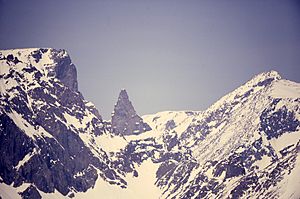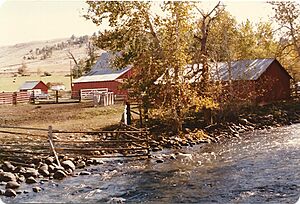Carbon County, Montana facts for kids
Quick facts for kids
Carbon County
|
|
|---|---|
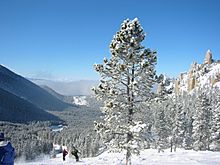
Palisades
|
|
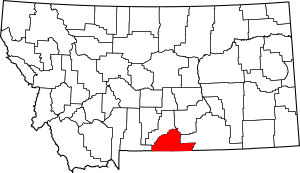
Location within the U.S. state of Montana
|
|
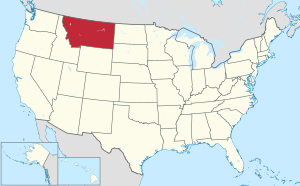 Montana's location within the U.S. |
|
| Country | |
| State | |
| Founded | March 4, 1895 |
| Seat | Red Lodge |
| Largest city | Red Lodge |
| Area | |
| • Total | 2,062 sq mi (5,340 km2) |
| • Land | 2,049 sq mi (5,310 km2) |
| • Water | 13 sq mi (30 km2) 0.6% |
| Population
(2020)
|
|
| • Total | 10,473 |
| • Estimate
(2023)
|
11,419 |
| • Density | 5.0790/sq mi (1.9610/km2) |
| Time zone | UTC−7 (Mountain) |
| • Summer (DST) | UTC−6 (MDT) |
| Congressional district | 2nd |
|
|
Carbon County is a county located in the U.S. state of Montana. As of the 2020 census, the population was 10,473. Its county seat is Red Lodge.
Carbon County is part of the Billings, MT Metropolitan Statistical Area.
Contents
History
Carbon County was named for the rich coal deposits found in the area. It was organized on March 4, 1895, from portions of Park and Yellowstone counties.
Land from Park and Yellowstone counties was used to form Carbon County on March 4, 1895. More than sixty federally designated historic sites are located in the county, including Petroglyph Canyon, one of the state's most important rock art sites.
The first commercial oil well in the state was established in Elk Basin fields in 1915.
Geography
According to the United States Census Bureau, the county has a total area of 2,062 square miles (5,340 km2), of which 2,049 square miles (5,310 km2) is land and 13 square miles (34 km2) (0.6%) is water.
Granite Peak, the state's highest mountain, is found in Carbon County's Beartooth Mountains. The Beartooth Highway, one of the "most spectacular alpine highways", links Red Lodge to Cooke City. The Pryor Mountains are in the east of the county, along with the Big Horn River.
Major highways
Adjacent counties
- Park County - west
- Stillwater County - north
- Yellowstone County - northeast
- Big Horn County - east
- Big Horn County, Wyoming - southeast
- Park County, Wyoming - south
National protected areas
- Bighorn Canyon National Recreation Area (part)
- Custer National Forest (part)
- Gallatin National Forest (part)
Demographics
| Historical population | |||
|---|---|---|---|
| Census | Pop. | %± | |
| 1900 | 7,533 | — | |
| 1910 | 13,962 | 85.3% | |
| 1920 | 15,279 | 9.4% | |
| 1930 | 12,571 | −17.7% | |
| 1940 | 11,865 | −5.6% | |
| 1950 | 10,241 | −13.7% | |
| 1960 | 8,317 | −18.8% | |
| 1970 | 7,080 | −14.9% | |
| 1980 | 8,099 | 14.4% | |
| 1990 | 8,080 | −0.2% | |
| 2000 | 9,552 | 18.2% | |
| 2010 | 10,078 | 5.5% | |
| 2020 | 10,473 | 3.9% | |
| 2023 (est.) | 11,419 | 13.3% | |
| U.S. Decennial Census 1790–1960, 1900–1990, 1990–2000, 2010–2020, 2023 |
|||
2020 census
As of the 2020 census, there were 10,473 people living in the county.
2010 census
As of the 2010 census, there were 10,078 people, 4,571 households, and 2,884 families living in the county. The population density was 4.9 inhabitants per square mile (1.9/km2). There were 6,441 housing units at an average density of 3.1 units per square mile (1.2 units/km2). The racial makeup of the county was 97.2% white, 0.8% American Indian, 0.3% black or African American, 0.2% Asian, 0.4% from other races, and 1.0% from two or more races. Those of Hispanic or Latino origin made up 1.9% of the population. In terms of ancestry, 32.3% were German, 16.2% were Irish, 14.5% were English, 12.6% were American, and 6.6% were Norwegian.
Of the 4,571 households, 23.6% had children under the age of 18 living with them, 53.4% were married couples living together, 6.1% had a female householder with no husband present, 36.9% were non-families, and 31.2% of all households were made up of individuals. The average household size was 2.19 and the average family size was 2.74. The median age was 48.1 years.
The median income for a household in the county was $49,010 and the median income for a family was $59,823. Males had a median income of $41,241 versus $26,150 for females. The per capita income for the county was $24,983. About 8.1% of families and 12.2% of the population were below the poverty line, including 14.1% of those under age 18 and 11.1% of those age 65 or over.
Economy
During the early history of Carbon County, coal mining was the predominant industry. The current economy relies on agriculture, recreation, and tourism.
In 2009 the top employers were Beartooth Hospital & Health Center, Red Lodge Mountain, and the Red Lodge Pizza Company.
In December 2014, construction began on a large windfarm, Mud Springs Wind Ranch, with 120 wind turbines, 12 miles (19 km) southeast of Bridger.
Communities
City
- Red Lodge (county seat)
Towns
Census-designated places
Unincorporated communities
Former communities
- Carbonado
- Chance
- Chickentown
- Fairbanks
- Gebo (originally Coalville)
- Golden
- International
- New Caledonia
- Riverview
- Scotch Coulee
- Stringtown
See also
 In Spanish: Condado de Carbon (Montana) para niños
In Spanish: Condado de Carbon (Montana) para niños


